Personality and Proactive Coping in University Students: A Review
VerifiedAdded on 2023/06/04
|11
|3490
|175
Essay
AI Summary
This essay explores the intricate relationship between personality traits, as defined by the Five Factor Model (openness, conscientiousness, extraversion, agreeableness, and neuroticism), and proactive coping strategies employed by university students to manage stress and challenges. It highlights the increasing pressures faced by students, including academic stress, social adjustments, and personal expectations, and examines how different personality traits influence their ability to cope effectively. The essay references various studies that link specific personality characteristics, such as extraversion and conscientiousness, with positive coping mechanisms, while neuroticism is associated with negative coping strategies like avoidance and self-blame. It emphasizes the importance of understanding these connections for developing personality-oriented counseling sessions in universities, ultimately aiming to improve students' mental health and academic performance. Desklib provides a platform to access this essay and many more resources for students.
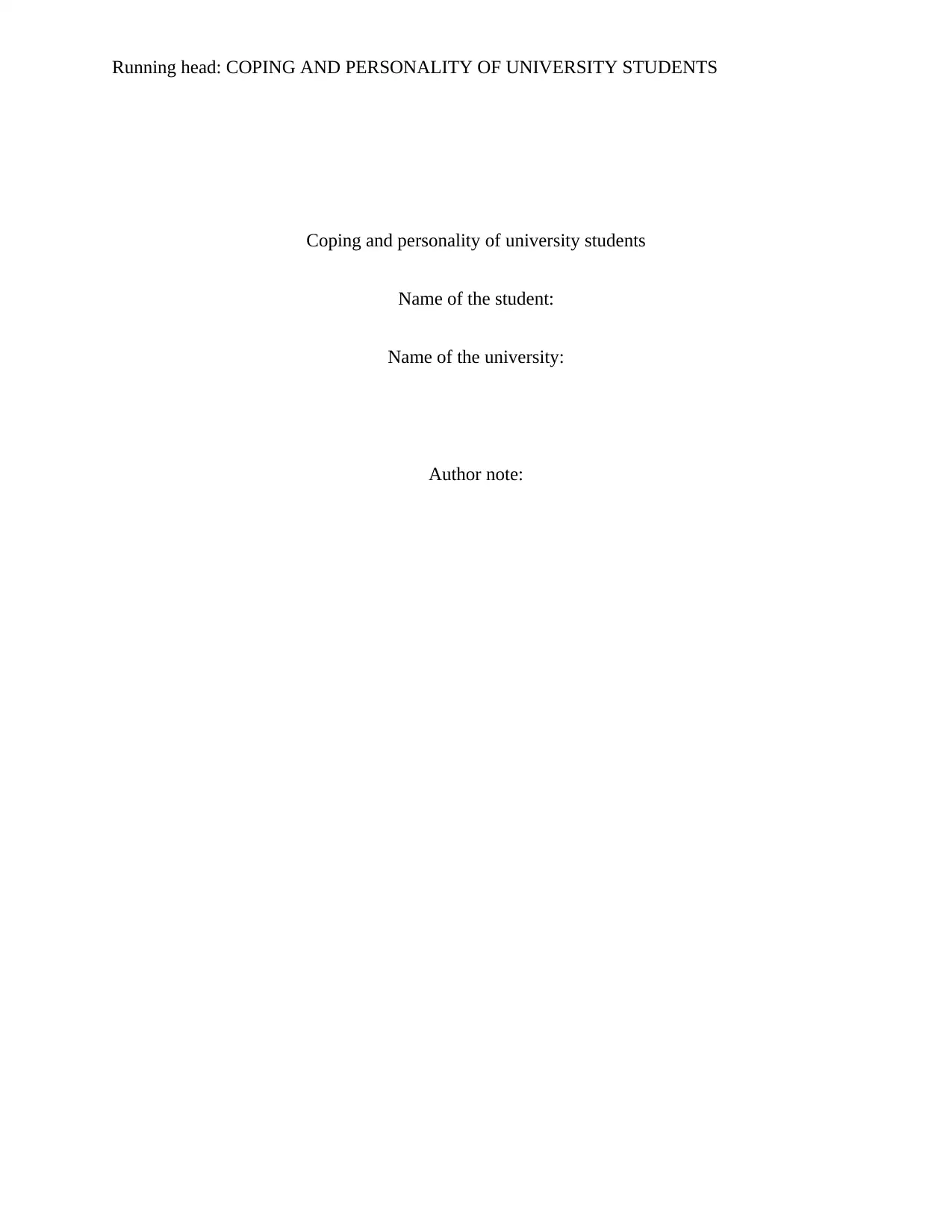
Running head: COPING AND PERSONALITY OF UNIVERSITY STUDENTS
Coping and personality of university students
Name of the student:
Name of the university:
Author note:
Coping and personality of university students
Name of the student:
Name of the university:
Author note:
Paraphrase This Document
Need a fresh take? Get an instant paraphrase of this document with our AI Paraphraser
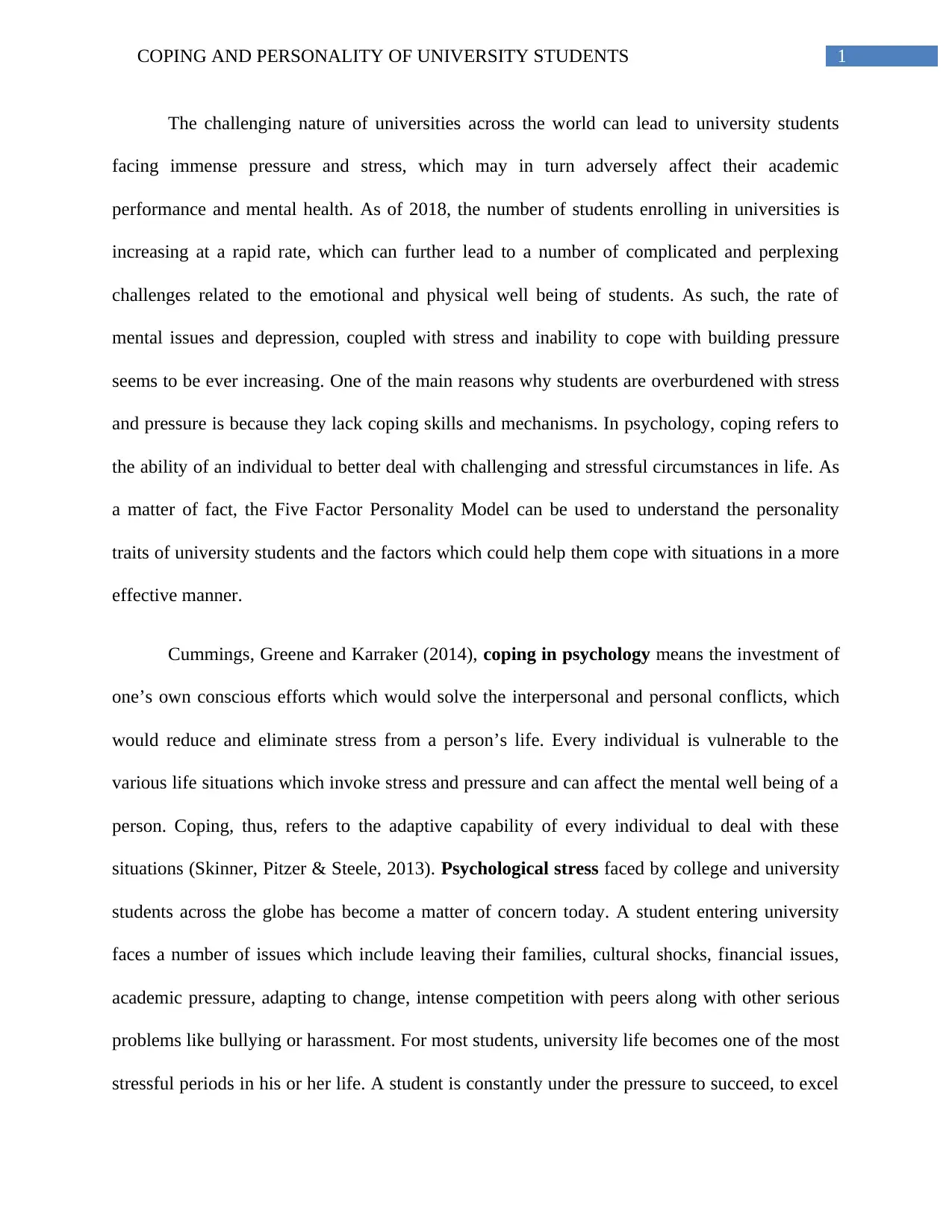
1COPING AND PERSONALITY OF UNIVERSITY STUDENTS
The challenging nature of universities across the world can lead to university students
facing immense pressure and stress, which may in turn adversely affect their academic
performance and mental health. As of 2018, the number of students enrolling in universities is
increasing at a rapid rate, which can further lead to a number of complicated and perplexing
challenges related to the emotional and physical well being of students. As such, the rate of
mental issues and depression, coupled with stress and inability to cope with building pressure
seems to be ever increasing. One of the main reasons why students are overburdened with stress
and pressure is because they lack coping skills and mechanisms. In psychology, coping refers to
the ability of an individual to better deal with challenging and stressful circumstances in life. As
a matter of fact, the Five Factor Personality Model can be used to understand the personality
traits of university students and the factors which could help them cope with situations in a more
effective manner.
Cummings, Greene and Karraker (2014), coping in psychology means the investment of
one’s own conscious efforts which would solve the interpersonal and personal conflicts, which
would reduce and eliminate stress from a person’s life. Every individual is vulnerable to the
various life situations which invoke stress and pressure and can affect the mental well being of a
person. Coping, thus, refers to the adaptive capability of every individual to deal with these
situations (Skinner, Pitzer & Steele, 2013). Psychological stress faced by college and university
students across the globe has become a matter of concern today. A student entering university
faces a number of issues which include leaving their families, cultural shocks, financial issues,
academic pressure, adapting to change, intense competition with peers along with other serious
problems like bullying or harassment. For most students, university life becomes one of the most
stressful periods in his or her life. A student is constantly under the pressure to succeed, to excel
The challenging nature of universities across the world can lead to university students
facing immense pressure and stress, which may in turn adversely affect their academic
performance and mental health. As of 2018, the number of students enrolling in universities is
increasing at a rapid rate, which can further lead to a number of complicated and perplexing
challenges related to the emotional and physical well being of students. As such, the rate of
mental issues and depression, coupled with stress and inability to cope with building pressure
seems to be ever increasing. One of the main reasons why students are overburdened with stress
and pressure is because they lack coping skills and mechanisms. In psychology, coping refers to
the ability of an individual to better deal with challenging and stressful circumstances in life. As
a matter of fact, the Five Factor Personality Model can be used to understand the personality
traits of university students and the factors which could help them cope with situations in a more
effective manner.
Cummings, Greene and Karraker (2014), coping in psychology means the investment of
one’s own conscious efforts which would solve the interpersonal and personal conflicts, which
would reduce and eliminate stress from a person’s life. Every individual is vulnerable to the
various life situations which invoke stress and pressure and can affect the mental well being of a
person. Coping, thus, refers to the adaptive capability of every individual to deal with these
situations (Skinner, Pitzer & Steele, 2013). Psychological stress faced by college and university
students across the globe has become a matter of concern today. A student entering university
faces a number of issues which include leaving their families, cultural shocks, financial issues,
academic pressure, adapting to change, intense competition with peers along with other serious
problems like bullying or harassment. For most students, university life becomes one of the most
stressful periods in his or her life. A student is constantly under the pressure to succeed, to excel
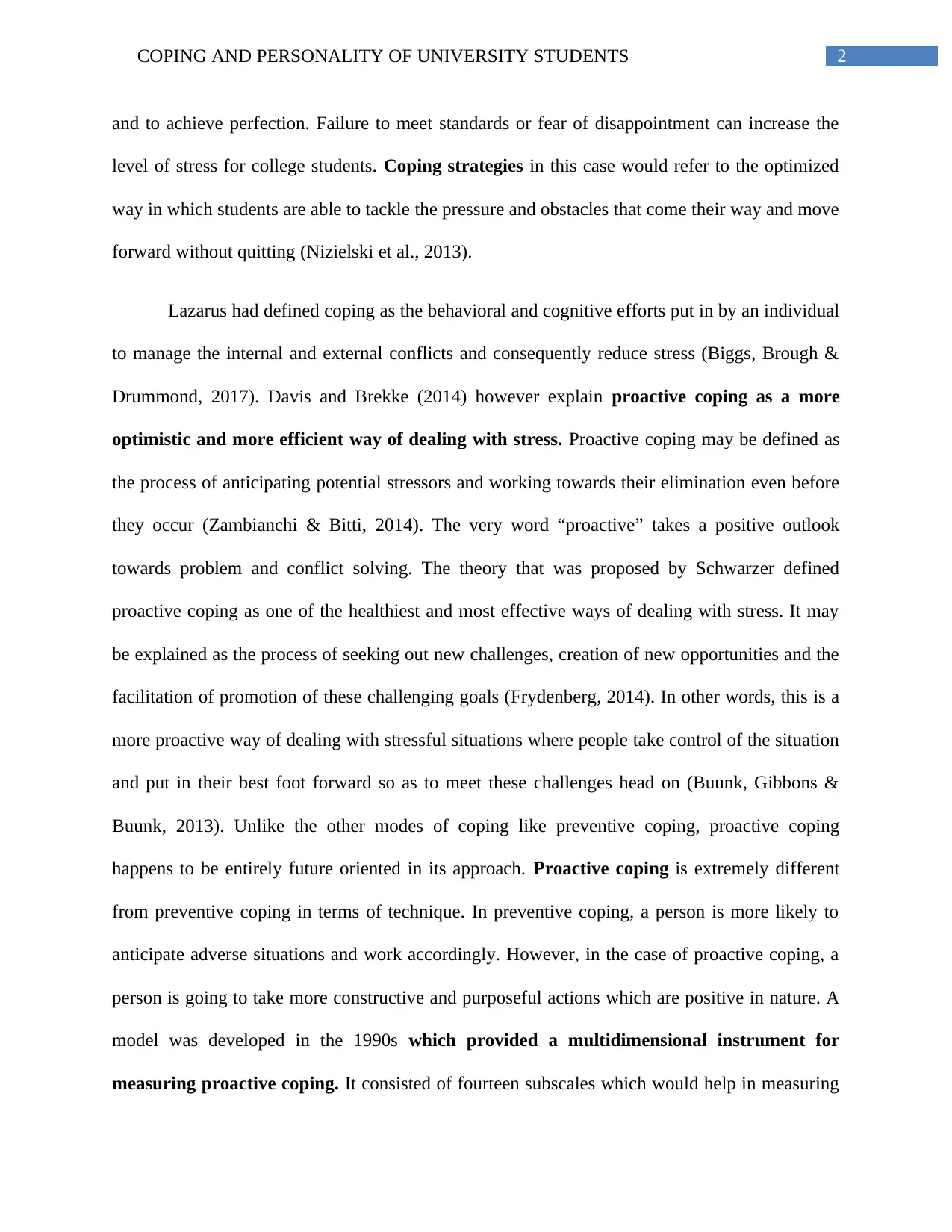
2COPING AND PERSONALITY OF UNIVERSITY STUDENTS
and to achieve perfection. Failure to meet standards or fear of disappointment can increase the
level of stress for college students. Coping strategies in this case would refer to the optimized
way in which students are able to tackle the pressure and obstacles that come their way and move
forward without quitting (Nizielski et al., 2013).
Lazarus had defined coping as the behavioral and cognitive efforts put in by an individual
to manage the internal and external conflicts and consequently reduce stress (Biggs, Brough &
Drummond, 2017). Davis and Brekke (2014) however explain proactive coping as a more
optimistic and more efficient way of dealing with stress. Proactive coping may be defined as
the process of anticipating potential stressors and working towards their elimination even before
they occur (Zambianchi & Bitti, 2014). The very word “proactive” takes a positive outlook
towards problem and conflict solving. The theory that was proposed by Schwarzer defined
proactive coping as one of the healthiest and most effective ways of dealing with stress. It may
be explained as the process of seeking out new challenges, creation of new opportunities and the
facilitation of promotion of these challenging goals (Frydenberg, 2014). In other words, this is a
more proactive way of dealing with stressful situations where people take control of the situation
and put in their best foot forward so as to meet these challenges head on (Buunk, Gibbons &
Buunk, 2013). Unlike the other modes of coping like preventive coping, proactive coping
happens to be entirely future oriented in its approach. Proactive coping is extremely different
from preventive coping in terms of technique. In preventive coping, a person is more likely to
anticipate adverse situations and work accordingly. However, in the case of proactive coping, a
person is going to take more constructive and purposeful actions which are positive in nature. A
model was developed in the 1990s which provided a multidimensional instrument for
measuring proactive coping. It consisted of fourteen subscales which would help in measuring
and to achieve perfection. Failure to meet standards or fear of disappointment can increase the
level of stress for college students. Coping strategies in this case would refer to the optimized
way in which students are able to tackle the pressure and obstacles that come their way and move
forward without quitting (Nizielski et al., 2013).
Lazarus had defined coping as the behavioral and cognitive efforts put in by an individual
to manage the internal and external conflicts and consequently reduce stress (Biggs, Brough &
Drummond, 2017). Davis and Brekke (2014) however explain proactive coping as a more
optimistic and more efficient way of dealing with stress. Proactive coping may be defined as
the process of anticipating potential stressors and working towards their elimination even before
they occur (Zambianchi & Bitti, 2014). The very word “proactive” takes a positive outlook
towards problem and conflict solving. The theory that was proposed by Schwarzer defined
proactive coping as one of the healthiest and most effective ways of dealing with stress. It may
be explained as the process of seeking out new challenges, creation of new opportunities and the
facilitation of promotion of these challenging goals (Frydenberg, 2014). In other words, this is a
more proactive way of dealing with stressful situations where people take control of the situation
and put in their best foot forward so as to meet these challenges head on (Buunk, Gibbons &
Buunk, 2013). Unlike the other modes of coping like preventive coping, proactive coping
happens to be entirely future oriented in its approach. Proactive coping is extremely different
from preventive coping in terms of technique. In preventive coping, a person is more likely to
anticipate adverse situations and work accordingly. However, in the case of proactive coping, a
person is going to take more constructive and purposeful actions which are positive in nature. A
model was developed in the 1990s which provided a multidimensional instrument for
measuring proactive coping. It consisted of fourteen subscales which would help in measuring
⊘ This is a preview!⊘
Do you want full access?
Subscribe today to unlock all pages.

Trusted by 1+ million students worldwide
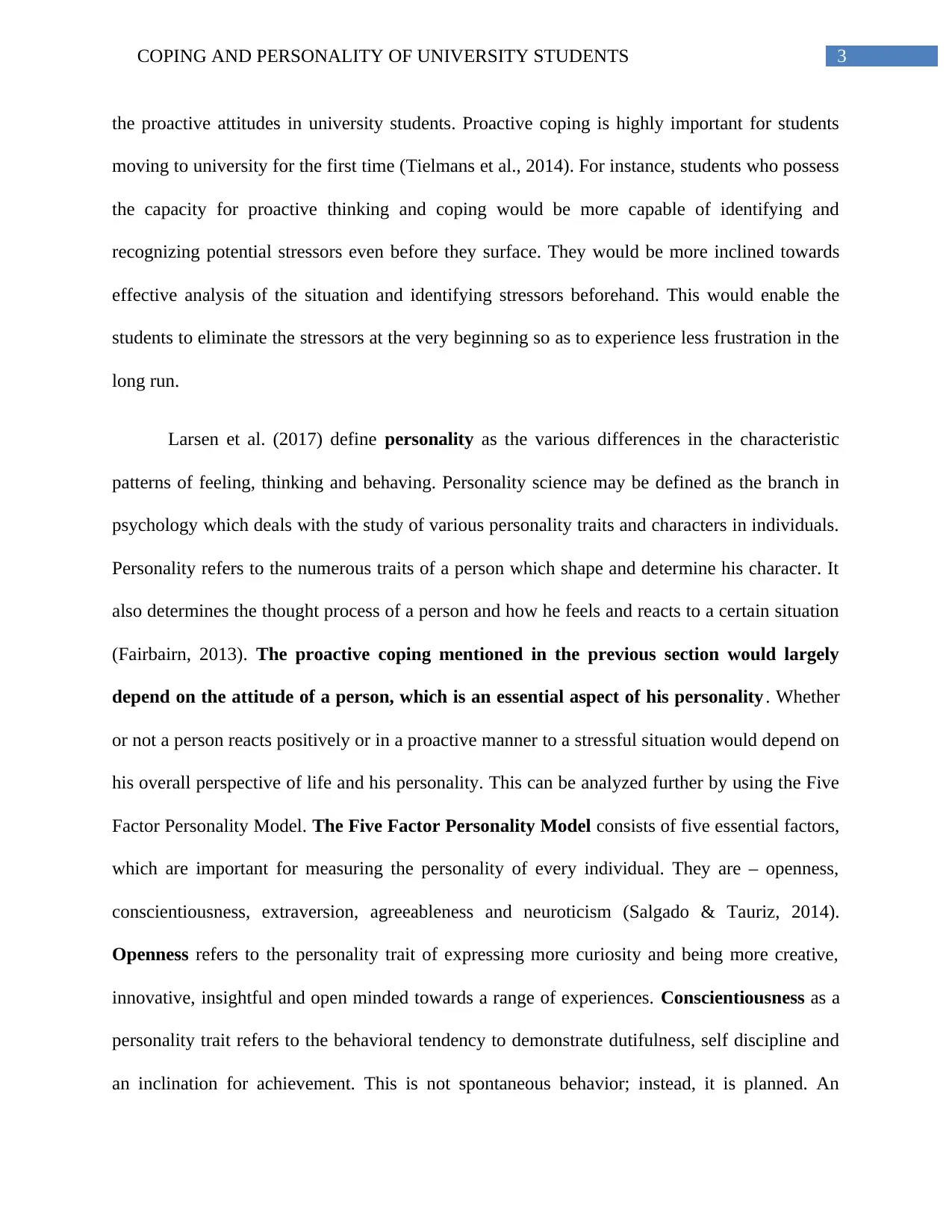
3COPING AND PERSONALITY OF UNIVERSITY STUDENTS
the proactive attitudes in university students. Proactive coping is highly important for students
moving to university for the first time (Tielmans et al., 2014). For instance, students who possess
the capacity for proactive thinking and coping would be more capable of identifying and
recognizing potential stressors even before they surface. They would be more inclined towards
effective analysis of the situation and identifying stressors beforehand. This would enable the
students to eliminate the stressors at the very beginning so as to experience less frustration in the
long run.
Larsen et al. (2017) define personality as the various differences in the characteristic
patterns of feeling, thinking and behaving. Personality science may be defined as the branch in
psychology which deals with the study of various personality traits and characters in individuals.
Personality refers to the numerous traits of a person which shape and determine his character. It
also determines the thought process of a person and how he feels and reacts to a certain situation
(Fairbairn, 2013). The proactive coping mentioned in the previous section would largely
depend on the attitude of a person, which is an essential aspect of his personality . Whether
or not a person reacts positively or in a proactive manner to a stressful situation would depend on
his overall perspective of life and his personality. This can be analyzed further by using the Five
Factor Personality Model. The Five Factor Personality Model consists of five essential factors,
which are important for measuring the personality of every individual. They are – openness,
conscientiousness, extraversion, agreeableness and neuroticism (Salgado & Tauriz, 2014).
Openness refers to the personality trait of expressing more curiosity and being more creative,
innovative, insightful and open minded towards a range of experiences. Conscientiousness as a
personality trait refers to the behavioral tendency to demonstrate dutifulness, self discipline and
an inclination for achievement. This is not spontaneous behavior; instead, it is planned. An
the proactive attitudes in university students. Proactive coping is highly important for students
moving to university for the first time (Tielmans et al., 2014). For instance, students who possess
the capacity for proactive thinking and coping would be more capable of identifying and
recognizing potential stressors even before they surface. They would be more inclined towards
effective analysis of the situation and identifying stressors beforehand. This would enable the
students to eliminate the stressors at the very beginning so as to experience less frustration in the
long run.
Larsen et al. (2017) define personality as the various differences in the characteristic
patterns of feeling, thinking and behaving. Personality science may be defined as the branch in
psychology which deals with the study of various personality traits and characters in individuals.
Personality refers to the numerous traits of a person which shape and determine his character. It
also determines the thought process of a person and how he feels and reacts to a certain situation
(Fairbairn, 2013). The proactive coping mentioned in the previous section would largely
depend on the attitude of a person, which is an essential aspect of his personality . Whether
or not a person reacts positively or in a proactive manner to a stressful situation would depend on
his overall perspective of life and his personality. This can be analyzed further by using the Five
Factor Personality Model. The Five Factor Personality Model consists of five essential factors,
which are important for measuring the personality of every individual. They are – openness,
conscientiousness, extraversion, agreeableness and neuroticism (Salgado & Tauriz, 2014).
Openness refers to the personality trait of expressing more curiosity and being more creative,
innovative, insightful and open minded towards a range of experiences. Conscientiousness as a
personality trait refers to the behavioral tendency to demonstrate dutifulness, self discipline and
an inclination for achievement. This is not spontaneous behavior; instead, it is planned. An
Paraphrase This Document
Need a fresh take? Get an instant paraphrase of this document with our AI Paraphraser
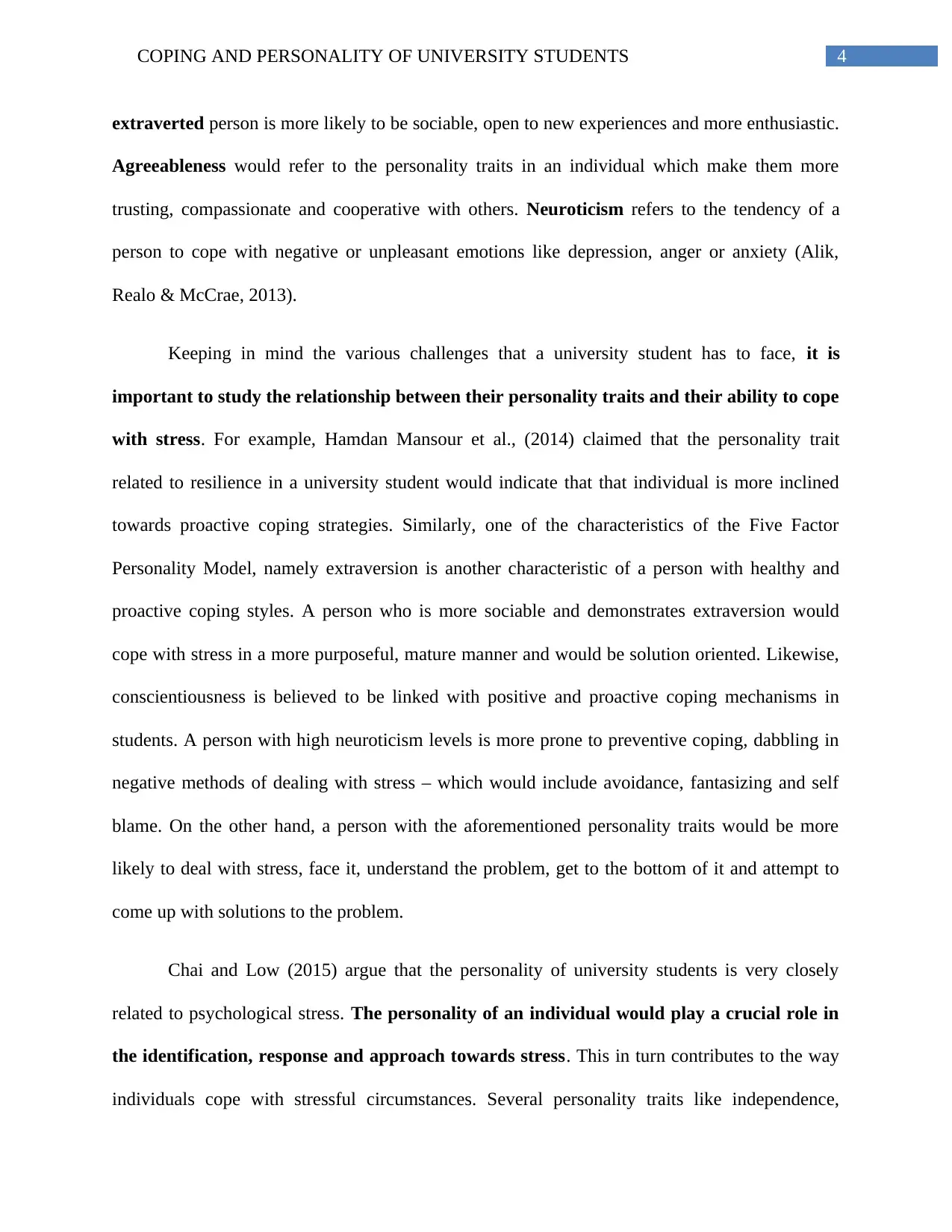
4COPING AND PERSONALITY OF UNIVERSITY STUDENTS
extraverted person is more likely to be sociable, open to new experiences and more enthusiastic.
Agreeableness would refer to the personality traits in an individual which make them more
trusting, compassionate and cooperative with others. Neuroticism refers to the tendency of a
person to cope with negative or unpleasant emotions like depression, anger or anxiety (Alik,
Realo & McCrae, 2013).
Keeping in mind the various challenges that a university student has to face, it is
important to study the relationship between their personality traits and their ability to cope
with stress. For example, Hamdan Mansour et al., (2014) claimed that the personality trait
related to resilience in a university student would indicate that that individual is more inclined
towards proactive coping strategies. Similarly, one of the characteristics of the Five Factor
Personality Model, namely extraversion is another characteristic of a person with healthy and
proactive coping styles. A person who is more sociable and demonstrates extraversion would
cope with stress in a more purposeful, mature manner and would be solution oriented. Likewise,
conscientiousness is believed to be linked with positive and proactive coping mechanisms in
students. A person with high neuroticism levels is more prone to preventive coping, dabbling in
negative methods of dealing with stress – which would include avoidance, fantasizing and self
blame. On the other hand, a person with the aforementioned personality traits would be more
likely to deal with stress, face it, understand the problem, get to the bottom of it and attempt to
come up with solutions to the problem.
Chai and Low (2015) argue that the personality of university students is very closely
related to psychological stress. The personality of an individual would play a crucial role in
the identification, response and approach towards stress. This in turn contributes to the way
individuals cope with stressful circumstances. Several personality traits like independence,
extraverted person is more likely to be sociable, open to new experiences and more enthusiastic.
Agreeableness would refer to the personality traits in an individual which make them more
trusting, compassionate and cooperative with others. Neuroticism refers to the tendency of a
person to cope with negative or unpleasant emotions like depression, anger or anxiety (Alik,
Realo & McCrae, 2013).
Keeping in mind the various challenges that a university student has to face, it is
important to study the relationship between their personality traits and their ability to cope
with stress. For example, Hamdan Mansour et al., (2014) claimed that the personality trait
related to resilience in a university student would indicate that that individual is more inclined
towards proactive coping strategies. Similarly, one of the characteristics of the Five Factor
Personality Model, namely extraversion is another characteristic of a person with healthy and
proactive coping styles. A person who is more sociable and demonstrates extraversion would
cope with stress in a more purposeful, mature manner and would be solution oriented. Likewise,
conscientiousness is believed to be linked with positive and proactive coping mechanisms in
students. A person with high neuroticism levels is more prone to preventive coping, dabbling in
negative methods of dealing with stress – which would include avoidance, fantasizing and self
blame. On the other hand, a person with the aforementioned personality traits would be more
likely to deal with stress, face it, understand the problem, get to the bottom of it and attempt to
come up with solutions to the problem.
Chai and Low (2015) argue that the personality of university students is very closely
related to psychological stress. The personality of an individual would play a crucial role in
the identification, response and approach towards stress. This in turn contributes to the way
individuals cope with stressful circumstances. Several personality traits like independence,
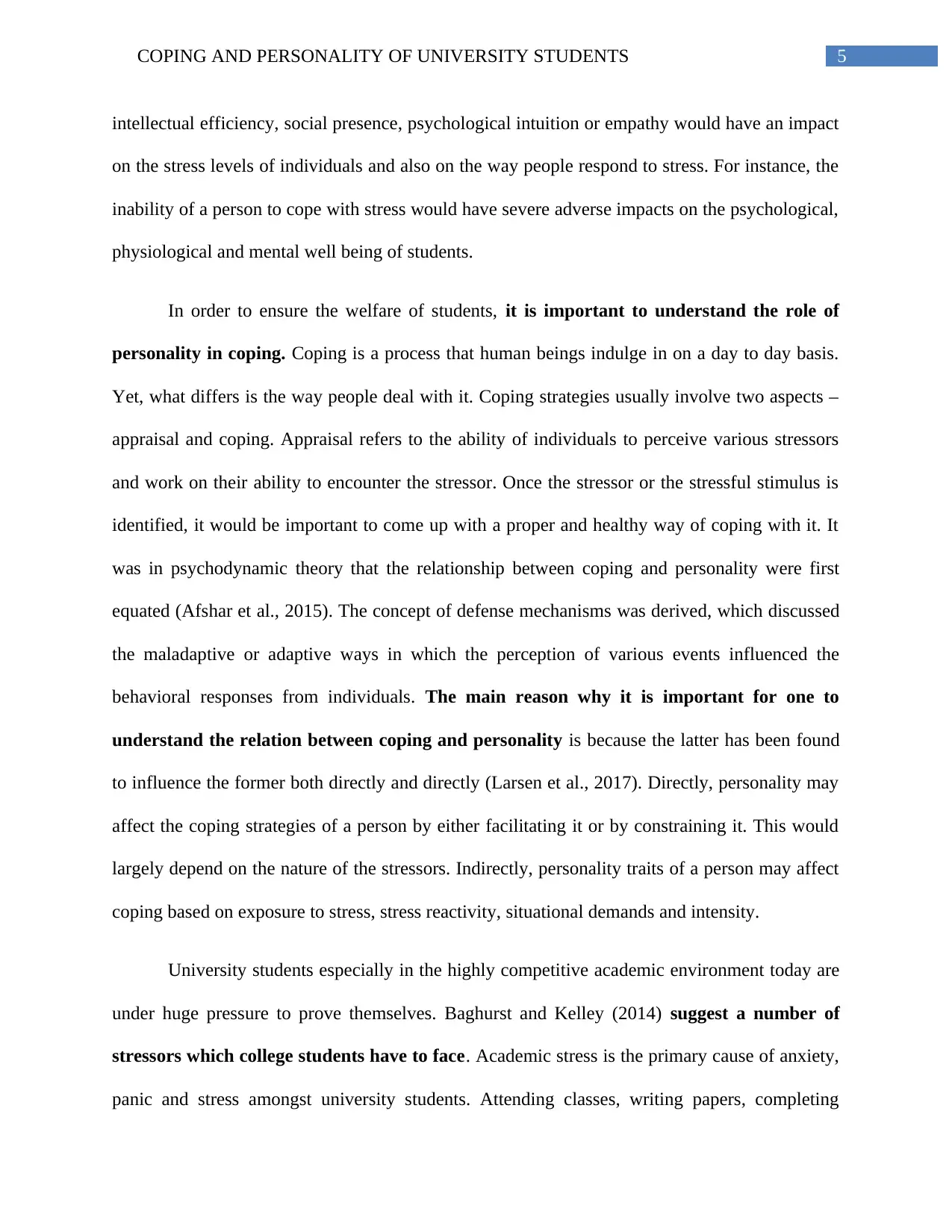
5COPING AND PERSONALITY OF UNIVERSITY STUDENTS
intellectual efficiency, social presence, psychological intuition or empathy would have an impact
on the stress levels of individuals and also on the way people respond to stress. For instance, the
inability of a person to cope with stress would have severe adverse impacts on the psychological,
physiological and mental well being of students.
In order to ensure the welfare of students, it is important to understand the role of
personality in coping. Coping is a process that human beings indulge in on a day to day basis.
Yet, what differs is the way people deal with it. Coping strategies usually involve two aspects –
appraisal and coping. Appraisal refers to the ability of individuals to perceive various stressors
and work on their ability to encounter the stressor. Once the stressor or the stressful stimulus is
identified, it would be important to come up with a proper and healthy way of coping with it. It
was in psychodynamic theory that the relationship between coping and personality were first
equated (Afshar et al., 2015). The concept of defense mechanisms was derived, which discussed
the maladaptive or adaptive ways in which the perception of various events influenced the
behavioral responses from individuals. The main reason why it is important for one to
understand the relation between coping and personality is because the latter has been found
to influence the former both directly and directly (Larsen et al., 2017). Directly, personality may
affect the coping strategies of a person by either facilitating it or by constraining it. This would
largely depend on the nature of the stressors. Indirectly, personality traits of a person may affect
coping based on exposure to stress, stress reactivity, situational demands and intensity.
University students especially in the highly competitive academic environment today are
under huge pressure to prove themselves. Baghurst and Kelley (2014) suggest a number of
stressors which college students have to face. Academic stress is the primary cause of anxiety,
panic and stress amongst university students. Attending classes, writing papers, completing
intellectual efficiency, social presence, psychological intuition or empathy would have an impact
on the stress levels of individuals and also on the way people respond to stress. For instance, the
inability of a person to cope with stress would have severe adverse impacts on the psychological,
physiological and mental well being of students.
In order to ensure the welfare of students, it is important to understand the role of
personality in coping. Coping is a process that human beings indulge in on a day to day basis.
Yet, what differs is the way people deal with it. Coping strategies usually involve two aspects –
appraisal and coping. Appraisal refers to the ability of individuals to perceive various stressors
and work on their ability to encounter the stressor. Once the stressor or the stressful stimulus is
identified, it would be important to come up with a proper and healthy way of coping with it. It
was in psychodynamic theory that the relationship between coping and personality were first
equated (Afshar et al., 2015). The concept of defense mechanisms was derived, which discussed
the maladaptive or adaptive ways in which the perception of various events influenced the
behavioral responses from individuals. The main reason why it is important for one to
understand the relation between coping and personality is because the latter has been found
to influence the former both directly and directly (Larsen et al., 2017). Directly, personality may
affect the coping strategies of a person by either facilitating it or by constraining it. This would
largely depend on the nature of the stressors. Indirectly, personality traits of a person may affect
coping based on exposure to stress, stress reactivity, situational demands and intensity.
University students especially in the highly competitive academic environment today are
under huge pressure to prove themselves. Baghurst and Kelley (2014) suggest a number of
stressors which college students have to face. Academic stress is the primary cause of anxiety,
panic and stress amongst university students. Attending classes, writing papers, completing
⊘ This is a preview!⊘
Do you want full access?
Subscribe today to unlock all pages.

Trusted by 1+ million students worldwide
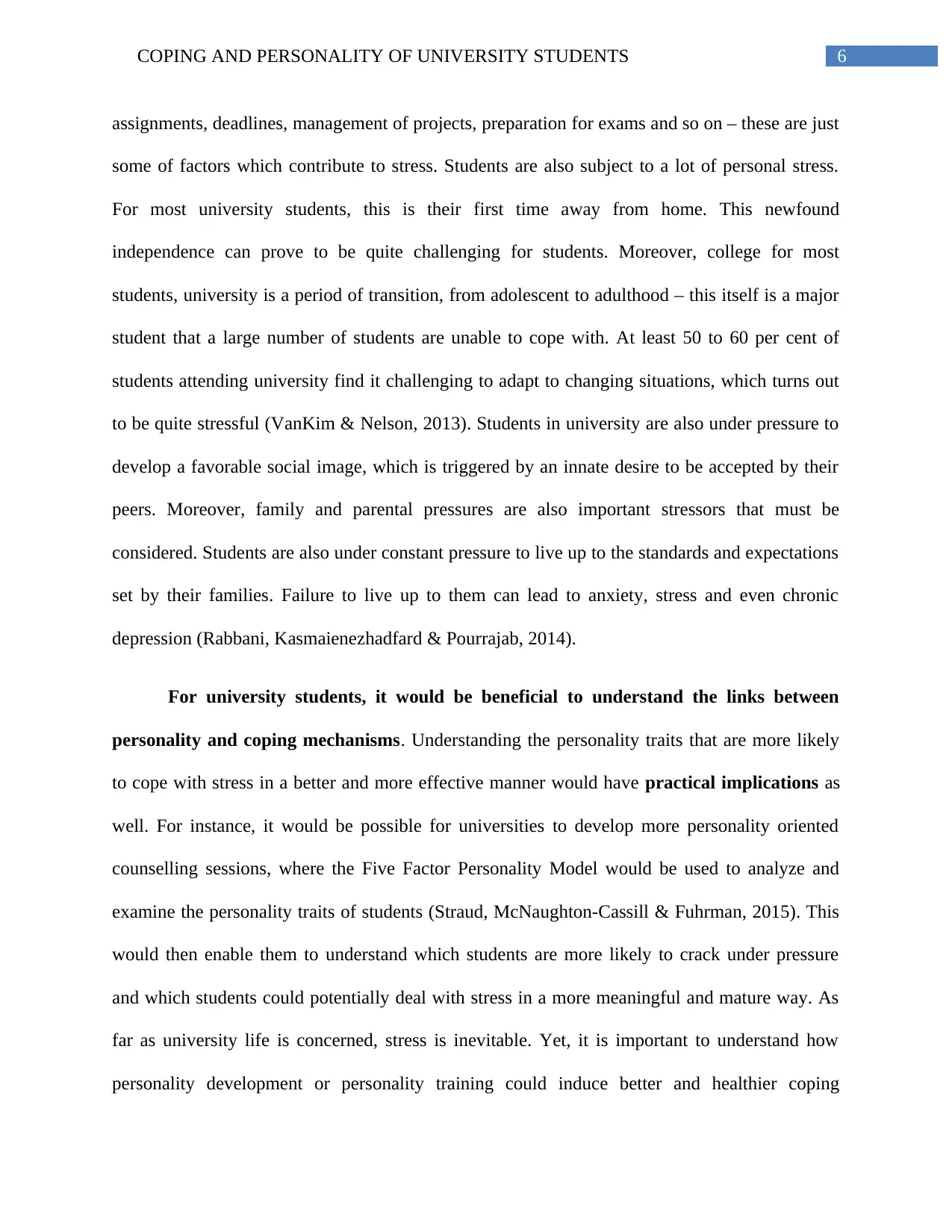
6COPING AND PERSONALITY OF UNIVERSITY STUDENTS
assignments, deadlines, management of projects, preparation for exams and so on – these are just
some of factors which contribute to stress. Students are also subject to a lot of personal stress.
For most university students, this is their first time away from home. This newfound
independence can prove to be quite challenging for students. Moreover, college for most
students, university is a period of transition, from adolescent to adulthood – this itself is a major
student that a large number of students are unable to cope with. At least 50 to 60 per cent of
students attending university find it challenging to adapt to changing situations, which turns out
to be quite stressful (VanKim & Nelson, 2013). Students in university are also under pressure to
develop a favorable social image, which is triggered by an innate desire to be accepted by their
peers. Moreover, family and parental pressures are also important stressors that must be
considered. Students are also under constant pressure to live up to the standards and expectations
set by their families. Failure to live up to them can lead to anxiety, stress and even chronic
depression (Rabbani, Kasmaienezhadfard & Pourrajab, 2014).
For university students, it would be beneficial to understand the links between
personality and coping mechanisms. Understanding the personality traits that are more likely
to cope with stress in a better and more effective manner would have practical implications as
well. For instance, it would be possible for universities to develop more personality oriented
counselling sessions, where the Five Factor Personality Model would be used to analyze and
examine the personality traits of students (Straud, McNaughton-Cassill & Fuhrman, 2015). This
would then enable them to understand which students are more likely to crack under pressure
and which students could potentially deal with stress in a more meaningful and mature way. As
far as university life is concerned, stress is inevitable. Yet, it is important to understand how
personality development or personality training could induce better and healthier coping
assignments, deadlines, management of projects, preparation for exams and so on – these are just
some of factors which contribute to stress. Students are also subject to a lot of personal stress.
For most university students, this is their first time away from home. This newfound
independence can prove to be quite challenging for students. Moreover, college for most
students, university is a period of transition, from adolescent to adulthood – this itself is a major
student that a large number of students are unable to cope with. At least 50 to 60 per cent of
students attending university find it challenging to adapt to changing situations, which turns out
to be quite stressful (VanKim & Nelson, 2013). Students in university are also under pressure to
develop a favorable social image, which is triggered by an innate desire to be accepted by their
peers. Moreover, family and parental pressures are also important stressors that must be
considered. Students are also under constant pressure to live up to the standards and expectations
set by their families. Failure to live up to them can lead to anxiety, stress and even chronic
depression (Rabbani, Kasmaienezhadfard & Pourrajab, 2014).
For university students, it would be beneficial to understand the links between
personality and coping mechanisms. Understanding the personality traits that are more likely
to cope with stress in a better and more effective manner would have practical implications as
well. For instance, it would be possible for universities to develop more personality oriented
counselling sessions, where the Five Factor Personality Model would be used to analyze and
examine the personality traits of students (Straud, McNaughton-Cassill & Fuhrman, 2015). This
would then enable them to understand which students are more likely to crack under pressure
and which students could potentially deal with stress in a more meaningful and mature way. As
far as university life is concerned, stress is inevitable. Yet, it is important to understand how
personality development or personality training could induce better and healthier coping
Paraphrase This Document
Need a fresh take? Get an instant paraphrase of this document with our AI Paraphraser
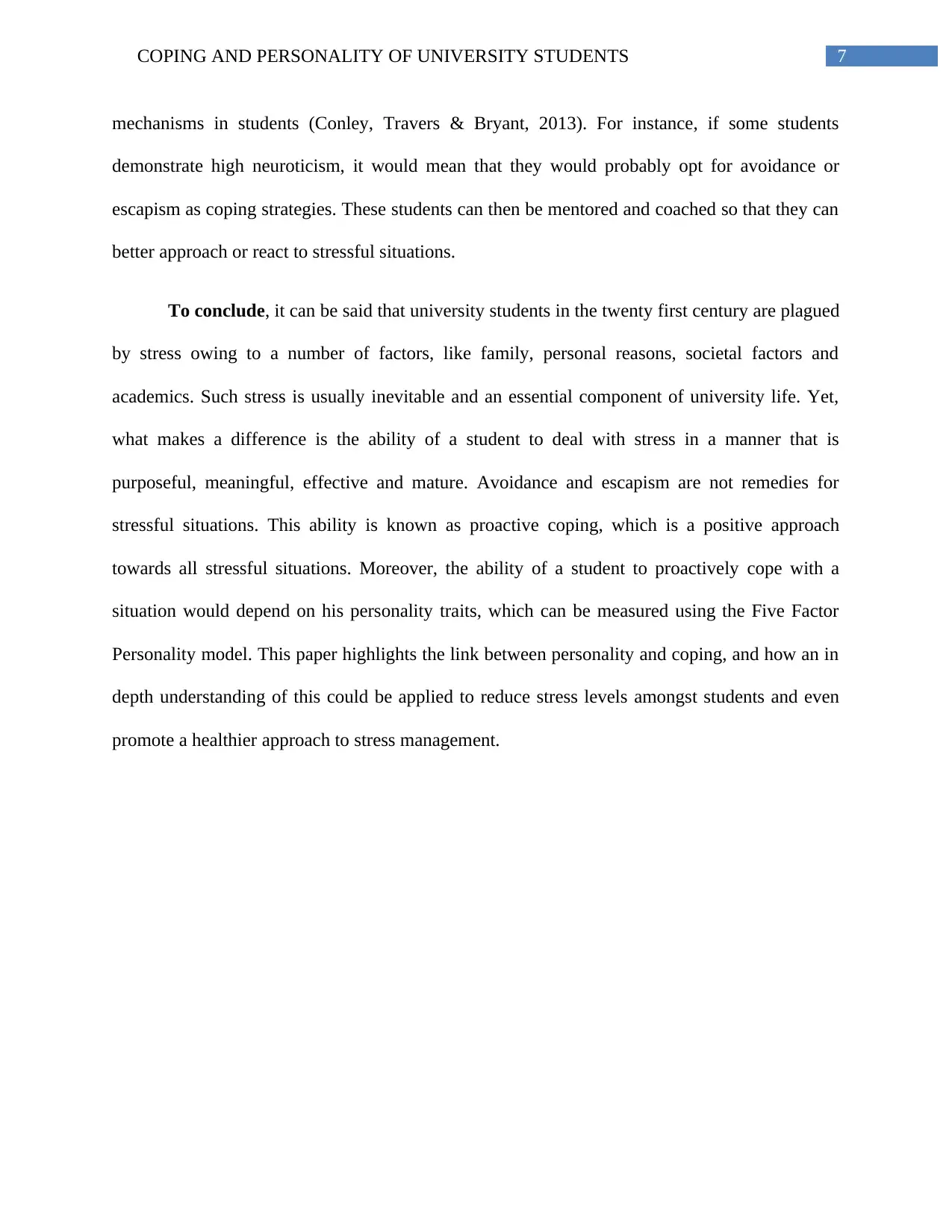
7COPING AND PERSONALITY OF UNIVERSITY STUDENTS
mechanisms in students (Conley, Travers & Bryant, 2013). For instance, if some students
demonstrate high neuroticism, it would mean that they would probably opt for avoidance or
escapism as coping strategies. These students can then be mentored and coached so that they can
better approach or react to stressful situations.
To conclude, it can be said that university students in the twenty first century are plagued
by stress owing to a number of factors, like family, personal reasons, societal factors and
academics. Such stress is usually inevitable and an essential component of university life. Yet,
what makes a difference is the ability of a student to deal with stress in a manner that is
purposeful, meaningful, effective and mature. Avoidance and escapism are not remedies for
stressful situations. This ability is known as proactive coping, which is a positive approach
towards all stressful situations. Moreover, the ability of a student to proactively cope with a
situation would depend on his personality traits, which can be measured using the Five Factor
Personality model. This paper highlights the link between personality and coping, and how an in
depth understanding of this could be applied to reduce stress levels amongst students and even
promote a healthier approach to stress management.
mechanisms in students (Conley, Travers & Bryant, 2013). For instance, if some students
demonstrate high neuroticism, it would mean that they would probably opt for avoidance or
escapism as coping strategies. These students can then be mentored and coached so that they can
better approach or react to stressful situations.
To conclude, it can be said that university students in the twenty first century are plagued
by stress owing to a number of factors, like family, personal reasons, societal factors and
academics. Such stress is usually inevitable and an essential component of university life. Yet,
what makes a difference is the ability of a student to deal with stress in a manner that is
purposeful, meaningful, effective and mature. Avoidance and escapism are not remedies for
stressful situations. This ability is known as proactive coping, which is a positive approach
towards all stressful situations. Moreover, the ability of a student to proactively cope with a
situation would depend on his personality traits, which can be measured using the Five Factor
Personality model. This paper highlights the link between personality and coping, and how an in
depth understanding of this could be applied to reduce stress levels amongst students and even
promote a healthier approach to stress management.
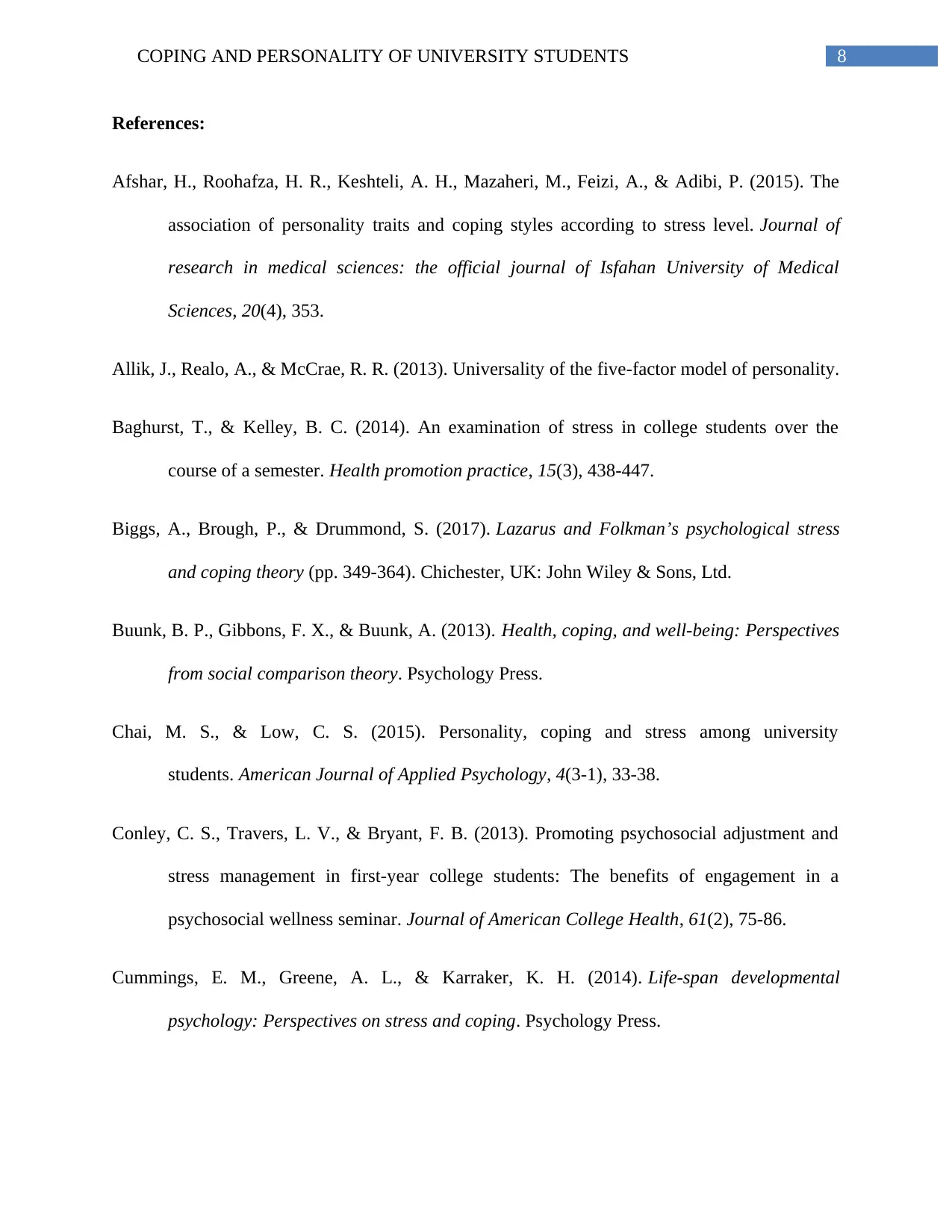
8COPING AND PERSONALITY OF UNIVERSITY STUDENTS
References:
Afshar, H., Roohafza, H. R., Keshteli, A. H., Mazaheri, M., Feizi, A., & Adibi, P. (2015). The
association of personality traits and coping styles according to stress level. Journal of
research in medical sciences: the official journal of Isfahan University of Medical
Sciences, 20(4), 353.
Allik, J., Realo, A., & McCrae, R. R. (2013). Universality of the five-factor model of personality.
Baghurst, T., & Kelley, B. C. (2014). An examination of stress in college students over the
course of a semester. Health promotion practice, 15(3), 438-447.
Biggs, A., Brough, P., & Drummond, S. (2017). Lazarus and Folkman’s psychological stress
and coping theory (pp. 349-364). Chichester, UK: John Wiley & Sons, Ltd.
Buunk, B. P., Gibbons, F. X., & Buunk, A. (2013). Health, coping, and well-being: Perspectives
from social comparison theory. Psychology Press.
Chai, M. S., & Low, C. S. (2015). Personality, coping and stress among university
students. American Journal of Applied Psychology, 4(3-1), 33-38.
Conley, C. S., Travers, L. V., & Bryant, F. B. (2013). Promoting psychosocial adjustment and
stress management in first-year college students: The benefits of engagement in a
psychosocial wellness seminar. Journal of American College Health, 61(2), 75-86.
Cummings, E. M., Greene, A. L., & Karraker, K. H. (2014). Life-span developmental
psychology: Perspectives on stress and coping. Psychology Press.
References:
Afshar, H., Roohafza, H. R., Keshteli, A. H., Mazaheri, M., Feizi, A., & Adibi, P. (2015). The
association of personality traits and coping styles according to stress level. Journal of
research in medical sciences: the official journal of Isfahan University of Medical
Sciences, 20(4), 353.
Allik, J., Realo, A., & McCrae, R. R. (2013). Universality of the five-factor model of personality.
Baghurst, T., & Kelley, B. C. (2014). An examination of stress in college students over the
course of a semester. Health promotion practice, 15(3), 438-447.
Biggs, A., Brough, P., & Drummond, S. (2017). Lazarus and Folkman’s psychological stress
and coping theory (pp. 349-364). Chichester, UK: John Wiley & Sons, Ltd.
Buunk, B. P., Gibbons, F. X., & Buunk, A. (2013). Health, coping, and well-being: Perspectives
from social comparison theory. Psychology Press.
Chai, M. S., & Low, C. S. (2015). Personality, coping and stress among university
students. American Journal of Applied Psychology, 4(3-1), 33-38.
Conley, C. S., Travers, L. V., & Bryant, F. B. (2013). Promoting psychosocial adjustment and
stress management in first-year college students: The benefits of engagement in a
psychosocial wellness seminar. Journal of American College Health, 61(2), 75-86.
Cummings, E. M., Greene, A. L., & Karraker, K. H. (2014). Life-span developmental
psychology: Perspectives on stress and coping. Psychology Press.
⊘ This is a preview!⊘
Do you want full access?
Subscribe today to unlock all pages.

Trusted by 1+ million students worldwide
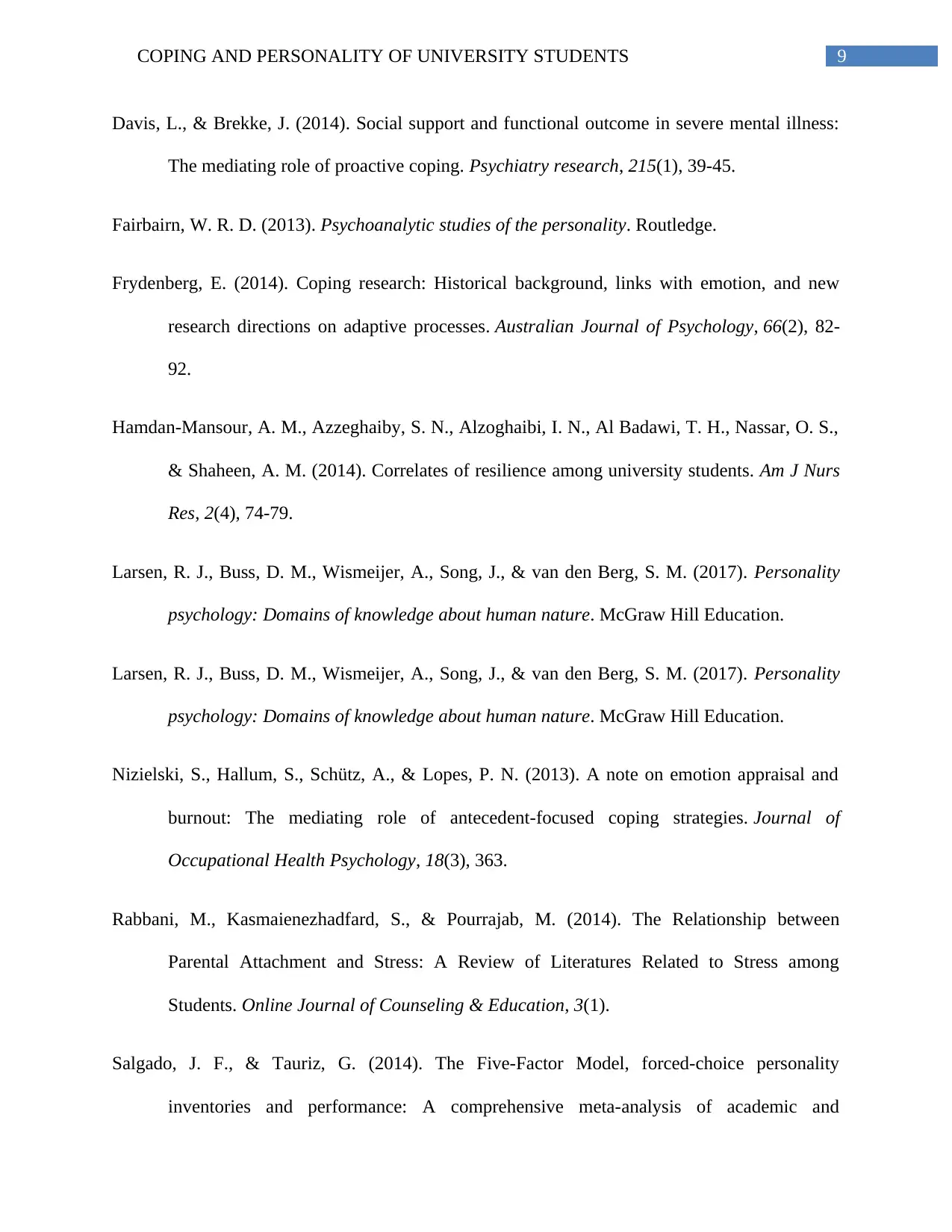
9COPING AND PERSONALITY OF UNIVERSITY STUDENTS
Davis, L., & Brekke, J. (2014). Social support and functional outcome in severe mental illness:
The mediating role of proactive coping. Psychiatry research, 215(1), 39-45.
Fairbairn, W. R. D. (2013). Psychoanalytic studies of the personality. Routledge.
Frydenberg, E. (2014). Coping research: Historical background, links with emotion, and new
research directions on adaptive processes. Australian Journal of Psychology, 66(2), 82-
92.
Hamdan-Mansour, A. M., Azzeghaiby, S. N., Alzoghaibi, I. N., Al Badawi, T. H., Nassar, O. S.,
& Shaheen, A. M. (2014). Correlates of resilience among university students. Am J Nurs
Res, 2(4), 74-79.
Larsen, R. J., Buss, D. M., Wismeijer, A., Song, J., & van den Berg, S. M. (2017). Personality
psychology: Domains of knowledge about human nature. McGraw Hill Education.
Larsen, R. J., Buss, D. M., Wismeijer, A., Song, J., & van den Berg, S. M. (2017). Personality
psychology: Domains of knowledge about human nature. McGraw Hill Education.
Nizielski, S., Hallum, S., Schütz, A., & Lopes, P. N. (2013). A note on emotion appraisal and
burnout: The mediating role of antecedent-focused coping strategies. Journal of
Occupational Health Psychology, 18(3), 363.
Rabbani, M., Kasmaienezhadfard, S., & Pourrajab, M. (2014). The Relationship between
Parental Attachment and Stress: A Review of Literatures Related to Stress among
Students. Online Journal of Counseling & Education, 3(1).
Salgado, J. F., & Tauriz, G. (2014). The Five-Factor Model, forced-choice personality
inventories and performance: A comprehensive meta-analysis of academic and
Davis, L., & Brekke, J. (2014). Social support and functional outcome in severe mental illness:
The mediating role of proactive coping. Psychiatry research, 215(1), 39-45.
Fairbairn, W. R. D. (2013). Psychoanalytic studies of the personality. Routledge.
Frydenberg, E. (2014). Coping research: Historical background, links with emotion, and new
research directions on adaptive processes. Australian Journal of Psychology, 66(2), 82-
92.
Hamdan-Mansour, A. M., Azzeghaiby, S. N., Alzoghaibi, I. N., Al Badawi, T. H., Nassar, O. S.,
& Shaheen, A. M. (2014). Correlates of resilience among university students. Am J Nurs
Res, 2(4), 74-79.
Larsen, R. J., Buss, D. M., Wismeijer, A., Song, J., & van den Berg, S. M. (2017). Personality
psychology: Domains of knowledge about human nature. McGraw Hill Education.
Larsen, R. J., Buss, D. M., Wismeijer, A., Song, J., & van den Berg, S. M. (2017). Personality
psychology: Domains of knowledge about human nature. McGraw Hill Education.
Nizielski, S., Hallum, S., Schütz, A., & Lopes, P. N. (2013). A note on emotion appraisal and
burnout: The mediating role of antecedent-focused coping strategies. Journal of
Occupational Health Psychology, 18(3), 363.
Rabbani, M., Kasmaienezhadfard, S., & Pourrajab, M. (2014). The Relationship between
Parental Attachment and Stress: A Review of Literatures Related to Stress among
Students. Online Journal of Counseling & Education, 3(1).
Salgado, J. F., & Tauriz, G. (2014). The Five-Factor Model, forced-choice personality
inventories and performance: A comprehensive meta-analysis of academic and
Paraphrase This Document
Need a fresh take? Get an instant paraphrase of this document with our AI Paraphraser
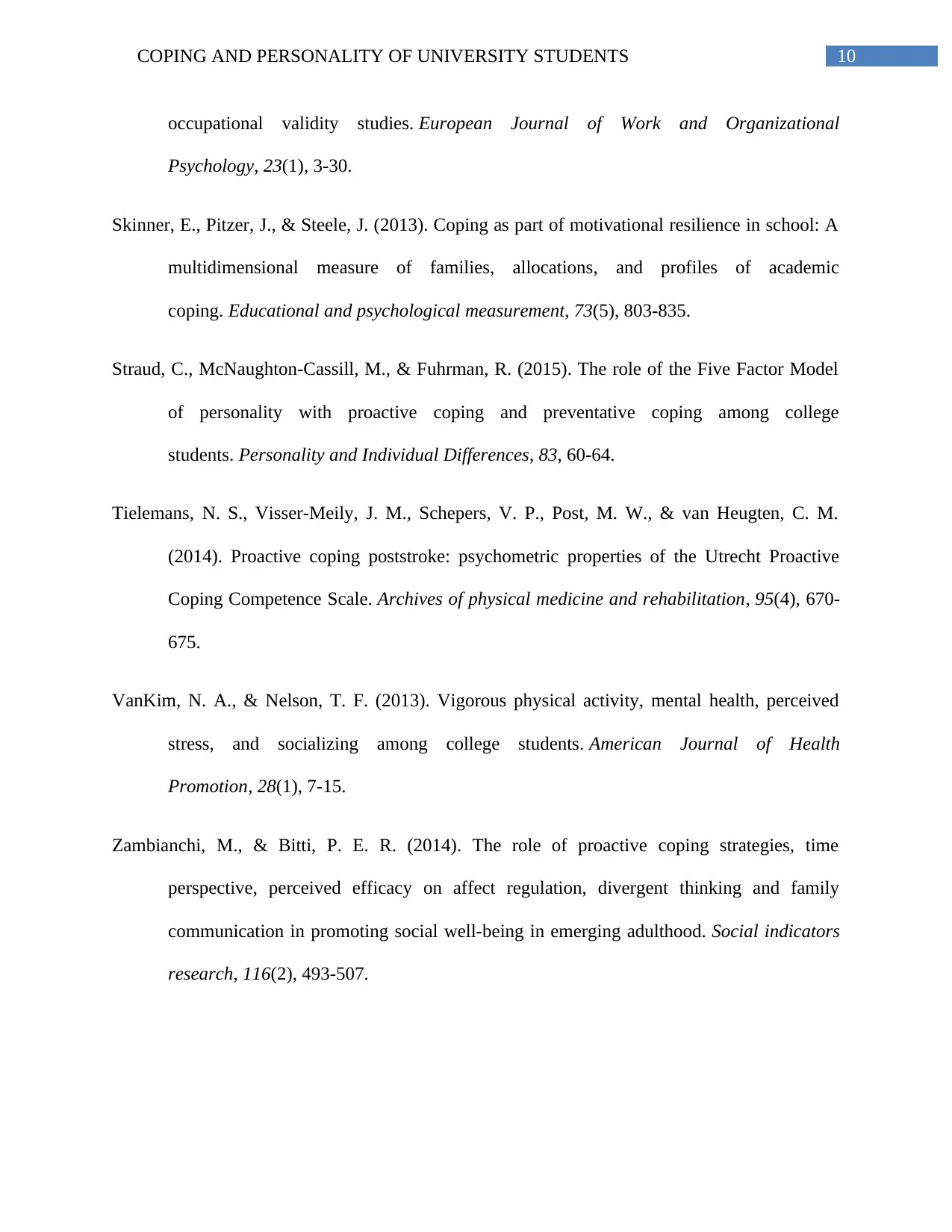
10COPING AND PERSONALITY OF UNIVERSITY STUDENTS
occupational validity studies. European Journal of Work and Organizational
Psychology, 23(1), 3-30.
Skinner, E., Pitzer, J., & Steele, J. (2013). Coping as part of motivational resilience in school: A
multidimensional measure of families, allocations, and profiles of academic
coping. Educational and psychological measurement, 73(5), 803-835.
Straud, C., McNaughton-Cassill, M., & Fuhrman, R. (2015). The role of the Five Factor Model
of personality with proactive coping and preventative coping among college
students. Personality and Individual Differences, 83, 60-64.
Tielemans, N. S., Visser-Meily, J. M., Schepers, V. P., Post, M. W., & van Heugten, C. M.
(2014). Proactive coping poststroke: psychometric properties of the Utrecht Proactive
Coping Competence Scale. Archives of physical medicine and rehabilitation, 95(4), 670-
675.
VanKim, N. A., & Nelson, T. F. (2013). Vigorous physical activity, mental health, perceived
stress, and socializing among college students. American Journal of Health
Promotion, 28(1), 7-15.
Zambianchi, M., & Bitti, P. E. R. (2014). The role of proactive coping strategies, time
perspective, perceived efficacy on affect regulation, divergent thinking and family
communication in promoting social well-being in emerging adulthood. Social indicators
research, 116(2), 493-507.
occupational validity studies. European Journal of Work and Organizational
Psychology, 23(1), 3-30.
Skinner, E., Pitzer, J., & Steele, J. (2013). Coping as part of motivational resilience in school: A
multidimensional measure of families, allocations, and profiles of academic
coping. Educational and psychological measurement, 73(5), 803-835.
Straud, C., McNaughton-Cassill, M., & Fuhrman, R. (2015). The role of the Five Factor Model
of personality with proactive coping and preventative coping among college
students. Personality and Individual Differences, 83, 60-64.
Tielemans, N. S., Visser-Meily, J. M., Schepers, V. P., Post, M. W., & van Heugten, C. M.
(2014). Proactive coping poststroke: psychometric properties of the Utrecht Proactive
Coping Competence Scale. Archives of physical medicine and rehabilitation, 95(4), 670-
675.
VanKim, N. A., & Nelson, T. F. (2013). Vigorous physical activity, mental health, perceived
stress, and socializing among college students. American Journal of Health
Promotion, 28(1), 7-15.
Zambianchi, M., & Bitti, P. E. R. (2014). The role of proactive coping strategies, time
perspective, perceived efficacy on affect regulation, divergent thinking and family
communication in promoting social well-being in emerging adulthood. Social indicators
research, 116(2), 493-507.
1 out of 11
Related Documents
Your All-in-One AI-Powered Toolkit for Academic Success.
+13062052269
info@desklib.com
Available 24*7 on WhatsApp / Email
![[object Object]](/_next/static/media/star-bottom.7253800d.svg)
Unlock your academic potential
Copyright © 2020–2026 A2Z Services. All Rights Reserved. Developed and managed by ZUCOL.





